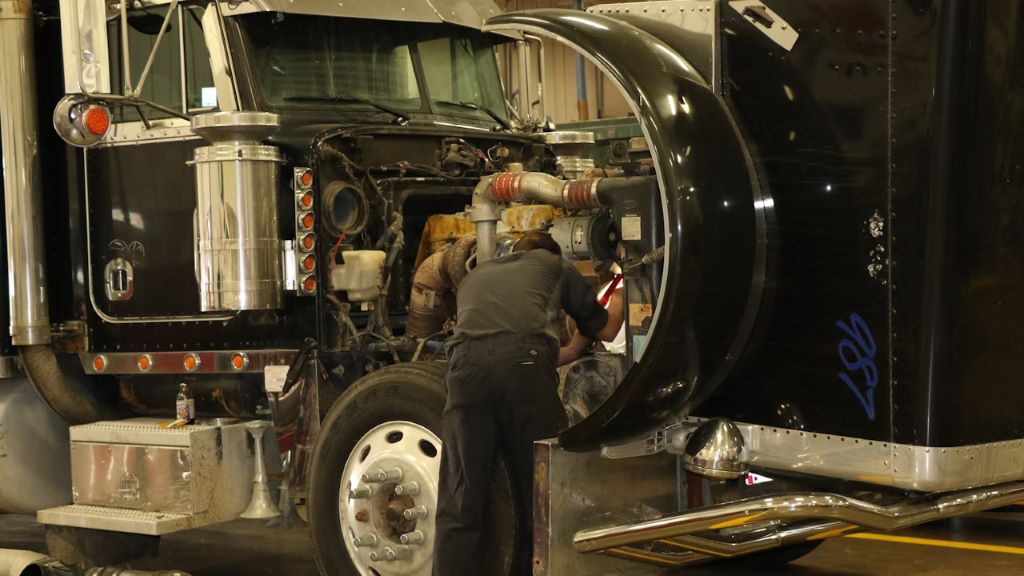Modern diesel trucks offer a winning combination of power, torque, and fuel efficiency. However, to meet ever-stricter emissions regulations, they rely on complex exhaust after treatment systems. These systems might seem like an additional hassle, but ignoring or tampering with them can lead to costly repairs, decreased performance, and even legal trouble.
What is an Exhaust Aftertreatment System?
Exhaust after treatment systems are designed to reduce harmful pollutants released in diesel exhaust. Key components include:
- Diesel Oxidation Catalyst (DOC): Converts carbon monoxide (CO) and hydrocarbons (HC) into less harmful carbon dioxide (CO2) and water (H2O).
- Diesel Particulate Filter (DPF): Traps soot (particulate matter) from the exhaust stream, preventing it from entering the atmosphere.
- Selective Catalytic Reduction (SCR): Uses Diesel Exhaust Fluid (DEF) to convert nitrogen oxides (NOx) into harmless nitrogen (N2) and water (H2O).
Why Ignoring Maintenance is a Bad Idea
Aftertreatment systems require regular maintenance to function properly. Here’s what can happen if you neglect them:
- DPF Clogging: If the DPF becomes clogged, your truck will experience decreased power, poor fuel economy, and may even enter “limp mode” to prevent engine damage. Forced regeneration cycles might temporarily clear clogs, but eventually, a clogged DPF will need costly replacement.
- Decreased Engine Performance: Backpressure from exhaust system restrictions can reduce engine power, increase fuel consumption and potentially lead to engine damage.
- DEF System Malfunctions: Ignoring low DEF levels or using contaminated DEF can damage the SCR system. Repairs to the DEF injection system and SCR catalyst can be expensive.
- Emissions Violations: Tampering with or removing aftertreatment components is illegal and can result in hefty fines. You’ll also fail emissions inspections in areas where these are required.
- Voided Warranty: Manufacturers can void your warranty if they discover you’ve tampered with or neglected the exhaust aftertreatment system.
The Dangers of Aftertreatment Deletes
Some diesel truck owners choose to delete their aftertreatment systems. This involves physically removing components like the DPF and SCR and modifying the engine’s software to operate without them. While tempting for promises of increased power, these “deletes” have serious consequences:
- Dramatic Emissions Increase: Deleting your aftertreatment system means your truck will spew out far more harmful pollutants, significantly impacting air quality and harming public health.
- Severe Legal Penalties: These modifications violate federal and possibly state emissions laws, leading to substantial fines and possibly impounding your vehicle.
- Reduced Resale Value: Knowledgeable buyers will avoid a truck with a deleted aftertreatment system due to potential legal and reliability issues.
6 Signs Your Heavy-Duty Truck Needs Diagnostics: Don’t Ignore These Warnings
Proactive Maintenance is Key
The most cost-effective way to handle your diesel truck’s aftertreatment system is to follow the manufacturer’s maintenance recommendations. Here’s how to keep things running smoothly:
- Use High-Quality Diesel Fuel: Low-quality fuel can clog DPFs and harm emissions components.
- Regular DPF Regeneration: Your truck will periodically perform automatic regeneration cycles to burn off trapped soot in the DPF. Make sure to complete these cycles by driving uninterrupted, avoiding excessive idling.
- Maintain Proper DEF Levels: Always use fresh, high-quality DEF and refill the tank before it runs empty. Never substitute with water or other liquids.
- Change Engine Oil as Recommended: High-ash oils can contribute to DPF clogging, so use the specific oils recommended for your truck’s engine.
- Address Warning Lights Promptly: Don’t ignore check engine lights or warning messages related to your aftertreatment system. Have these problems diagnosed and repaired as soon as possible.
The Value of a Well-Maintained Truck
While the aftertreatment system might seem like an extra layer of complexity, it’s integral to the long-term health and value of your diesel truck. By staying on top of maintenance, you’ll enjoy improved reliability, better fuel economy, full engine performance, and peace of mind knowing you’re doing your part for the environment.
Investing in a modern diesel truck is a significant commitment. Protecting that investment includes taking care of the exhaust aftertreatment system, ensuring your truck remains a dependable and valuable asset for many years to come.









